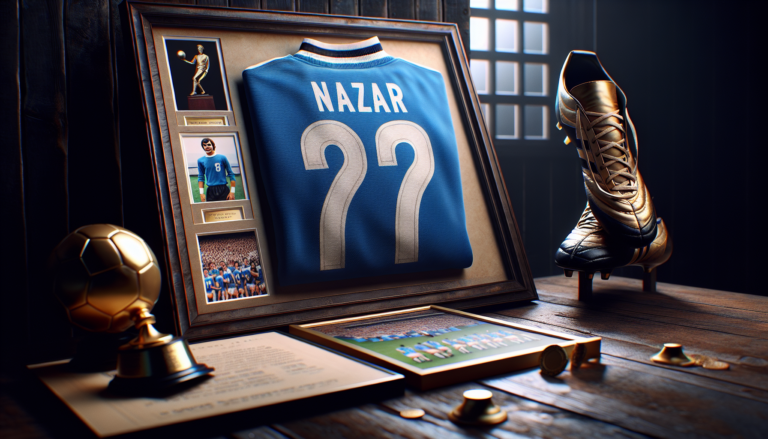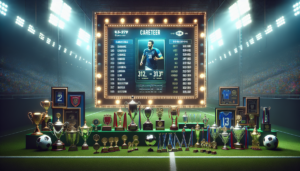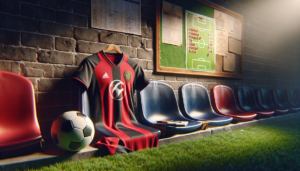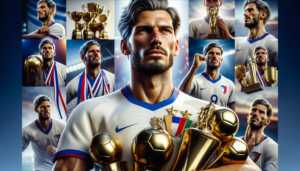Ronaldo Nazário, a Brazilian football legend, was born on September 18, 1976, in Rio de Janeiro. Known for his exceptional skill and physical attributes, Ronaldo is widely regarded as one of the greatest centre-forwards in the history of the sport. His illustrious career spanned over two decades, during which he played for some of the most prestigious clubs in the world and achieved numerous individual and team accolades.
With an impressive career record of 481 matches played, 309 goals scored, and 75 assists provided, Ronaldo left an indelible mark on the beautiful game. He also represented Brazil with distinction, earning 105 international caps and helping his country win two FIFA World Cups. Ronaldo’s impact extended beyond his on-field achievements, as he became a global icon and inspired countless young players around the world.
Introduction to Ronaldo Nazário
Early Life and Background
Ronaldo Nazário was born and raised in Rio de Janeiro, Brazil. From a young age, he showed a natural talent for football and began playing in local youth teams. Ronaldo’s exceptional skills soon caught the attention of scouts, and he joined the youth academy of São Cristóvão, where he honed his abilities and developed into a promising young player.
Growing up in a football-mad nation like Brazil, Ronaldo was surrounded by the sport and drew inspiration from the legendary players who came before him. He idolized the likes of Pelé and Zico, aspiring to one day achieve similar greatness on the field.
Rise to Fame
Ronaldo’s rise to fame began in earnest when he joined Cruzeiro, one of Brazil’s most successful clubs, at the age of 16. He quickly established himself as a prodigious talent, scoring goals at an astonishing rate and helping his team win the Copa do Brasil in 1993.
His performances caught the eye of European scouts, and in 1994, Ronaldo made the move to PSV Eindhoven in the Netherlands. It was at PSV where he truly announced himself to the world, scoring 54 goals in 57 appearances over two seasons. Ronaldo’s speed, power, and clinical finishing made him a nightmare for defenders, and he soon became one of the most sought-after players in Europe.
Club Career Highlights
Cruzeiro and PSV
Ronaldo’s early career at Cruzeiro and PSV laid the foundation for his future success. At Cruzeiro, he showcased his immense potential, scoring 44 goals in 47 appearances and helping the team win the Copa do Brasil in 1993. His performances earned him a move to Europe, where he joined PSV Eindhoven.
At PSV, Ronaldo took his game to new heights. He formed a lethal partnership with fellow Brazilian Romário, and together they terrorized defenses in the Eredivisie. Ronaldo’s two seasons at PSV yielded an incredible 54 goals in 57 appearances, cementing his status as one of the world’s most exciting young talents.
Barcelona and Inter Milan
In 1996, Ronaldo made a high-profile move to Barcelona, where he continued his goal-scoring exploits. He netted an astonishing 47 goals in 49 appearances in his sole season at the Catalan club, helping them win the Copa del Rey and UEFA Cup Winners’ Cup. Ronaldo’s performances earned him his first FIFA World Player of the Year award in 1996.
After his successful stint at Barcelona, Ronaldo joined Inter Milan in 1997. It was at Inter where he truly established himself as the best player in the world. He won the UEFA Cup in 1998 and led the team to the Serie A title in 1998-99. Ronaldo’s time at Inter was marred by injuries, but he still managed to score 59 goals in 99 appearances for the Nerazzurri.
Real Madrid and AC Milan
In 2002, Ronaldo made a then-world record transfer to Real Madrid, where he formed a fearsome attacking trio with Zinedine Zidane and Luís Figo. Despite struggling with injuries, he helped Real Madrid win the La Liga title in his first season and scored a memorable hat-trick in the UEFA Champions League final against Manchester United.
After leaving Real Madrid in 2007, Ronaldo had a brief stint at AC Milan before returning to Brazil to play for Corinthians. Although his time at Milan was short-lived, he still managed to showcase flashes of his brilliance and scored some crucial goals for the Rossoneri.
Corinthians and Retirement
Ronaldo’s final club was Corinthians, where he played from 2009 to 2011. Although he was no longer at the peak of his powers, Ronaldo’s presence and leadership were invaluable to the team. He helped Corinthians win the Copa do Brasil in 2009 and the Campeonato Paulista in 2009.
On February 13, 2011, Ronaldo announced his retirement from football. In an emotional press conference, he cited his ongoing struggles with injuries and his desire to focus on his family as the primary reasons for his decision. Ronaldo’s retirement marked the end of an era, as one of the greatest players of all time hung up his boots for good.
International Career with Brazil
World Cup Triumphs
Ronaldo’s international career with Brazil was nothing short of spectacular. He was a key member of the Brazilian squad that won the World Cup in 1994, although he did not feature in the final due to injury. However, it was at the 1998 World Cup where Ronaldo truly announced himself on the global stage.
Despite suffering a convulsive fit just hours before the final against France, Ronaldo still played the full 90 minutes. Although Brazil lost the match 3-0, Ronaldo’s bravery and determination in the face of adversity earned him widespread admiration. He would go on to redeem himself at the 2002 World Cup, scoring eight goals, including two in the final against Germany, to help Brazil lift the trophy for a record fifth time.
Copa América Success
In addition to his World Cup triumphs, Ronaldo also enjoyed success in the Copa América, South America’s premier international tournament. He helped Brazil win the competition in 1997 and 1999, scoring a total of six goals across the two tournaments.
Ronaldo’s performances in the Copa América further cemented his status as one of the greatest players in the history of the Brazilian national team. His speed, skill, and clinical finishing made him a constant threat to opposition defenses, and he formed a lethal partnership with other Brazilian greats such as Rivaldo and Ronaldinho.
Individual Achievements and Awards
Ballon d’Or Wins
Ronaldo’s individual achievements are a testament to his immense talent and impact on the game. He won the Ballon d’Or, awarded to the best player in Europe, on two occasions – in 1997 and 2002. His 1997 win came after his incredible season at Barcelona, where he scored 47 goals in 49 appearances.
Ronaldo’s second Ballon d’Or win in 2002 was perhaps even more impressive, as it came after a long period of injury and adversity. He had missed the entire 2000-01 season due to a knee injury and many doubted whether he would ever return to his best. However, Ronaldo silenced his critics with a stunning performances at the 2002 World Cup, leading Brazil to glory and winning the Golden Boot as the tournament’s top scorer.
The Best FIFA Men’s Player
In addition to his Ballon d’Or wins, Ronaldo also claimed FIFA World Player of the Year award on three occasions – in 1996, 1997, and 2002. These awards recognized his consistent excellence and dominance on the global stage.
Ronaldo’s FIFA World Player of the Year wins came during a period when he was widely regarded as the best player in the world. His combination of pace, power, skill and finishing was unmatched, and he consistently delivered in the biggest matches for both club and country.
Legacy and Impact on Football
Skill and Playing Style
Ronaldo’s playing style was a perfect blend of speed, strength, and technical ability. He possessed a remarkable burst of pace that allowed him to leave defenders in his wake, while his close control and dribbling skills made him almost impossible to dispossess. Ronaldo was also an excellent finisher, capable of scoring with both feet and his head.
Perhaps what set Ronaldo apart from his contemporaries was his ability to perform in the biggest matches. He had a knack for scoring crucial goals in finals and high-pressure situations, as evidenced by his performances in the World Cup and UEFA Champions League. Ronaldo’s big-game mentality and ability to deliver when it mattered most cemented his status as a true great of the game.
Influence on Future Generations
Ronaldo’s impact on football extends far beyond his on-field achievements. He inspired a generation of young players around the world, who grew up idolizing his skills and trying to emulate his style of play. Many of today’s top forwards, such as Lionel Messi and Cristiano Ronaldo, have cited Ronaldo as an influence and role model.
Ronaldo’s legacy also extends to his off-field persona and charitable work. He has been involved in numerous philanthropic endeavors over the years, using his fame and fortune to help those less fortunate. Ronaldo’s humility, kindness, and generosity have endeared him to fans around the world, and cemented his status as a true icon of the game.
Life After Retirement
Role at Cruzeiro
After retiring from professional football in 2011, Ronaldo remained involved in the game in various capacities. In 2018, he became a board member at Cruzeiro, the Brazilian club where he started his career. In this role, Ronaldo has been involved in the club’s strategic planning and decision-making processes.
Ronaldo’s presence at Cruzeiro has brought renewed enthusiasm and optimism to the club and its fans. His experience and knowledge of the game have been invaluable in helping Cruzeiro navigate the challenges of modern football, both on and off the pitch.
Involvement in Social Projects
In addition to his role at Cruzeiro, Ronaldo has also been actively involved in various social projects and charitable initiatives. He has used his platform and influence to raise awareness about important issues such as poverty, education, and health care.
One of Ronaldo’s most notable philanthropic endeavors is the “Fundação Fenômenos”, a charitable foundation he established in 2004. The foundation focuses on providing educational and social support to underprivileged children and families in Brazil. Ronaldo’s commitment to giving back to his community and using his success to make a positive impact on the world has only added to his legend and legacy.
Ronaldo Nazário in Popular Media
YouTube Content and Fan Engagement
In recent years, Ronaldo has also become a popular figure on social media, particularly on YouTube. His channel, which features a mix of interviews, highlights, and behind-the-scenes content, has amassed over a million subscribers and tens of millions of views.
One of the most popular videos on Ronaldo’s channel is his “Ultimate XI” selection, in which he names his all-time best eleven players. The video has been viewed over 10 million times, with fans around the world eager to hear Ronaldo’s thoughts on the greatest players in football history.
Ultimate XI Video
Ronaldo’s “Ultimate XI” video is a testament to his enduring popularity and influence in the world of football. The video features Ronaldo discussing his picks for the greatest players in each position, providing insights and anecdotes about each selection.
The video has generated significant discussion and debate among fans, with many eager to compare their own “Ultimate XI” selections to Ronaldo’s. The fact that a retired player can still generate such buzz and engagement is a testament to Ronaldo’s lasting impact on the sport and his status as a true icon of the game.
In conclusion, Ronaldo Nazário’s career and legacy are a testament to his incredible talent, dedication, and impact on the world of football. From his early days at Cruzeiro and PSV to his legendary stints at Barcelona, Inter Milan, and Real Madrid, Ronaldo consistently delivered on the biggest stages and cemented his status as one of the greatest players of all time. His individual accolades, including multiple Ballon d’Or and FIFA World Player of the Year awards, only serve to underscore his immense contributions to the sport.
Off the field, Ronaldo’s influence has been just as significant. His charitable work and commitment to social causes have made him a role model for millions around the world, while his enduring popularity on social media and YouTube have ensured that his legacy will continue to inspire future generations of football fans and players alike. Ronaldo Nazário’s place in the pantheon of football greats is secure, and his impact on the beautiful game will be felt for years to come.






